Key takeaways:
- Cannabis taxation is complex and varies by state, impacting pricing, market dynamics, and industry sustainability.
- Proper taxation generates revenue for public programs and enhances the legitimacy of the cannabis industry, promoting responsible use.
- Expos provide vital networking opportunities and insights into cannabis taxation challenges that businesses face, including compliance and varying regulations.
- Successful tax planning in cannabis requires meticulous record-keeping, consulting tax professionals, and adapting to regulatory changes proactively.
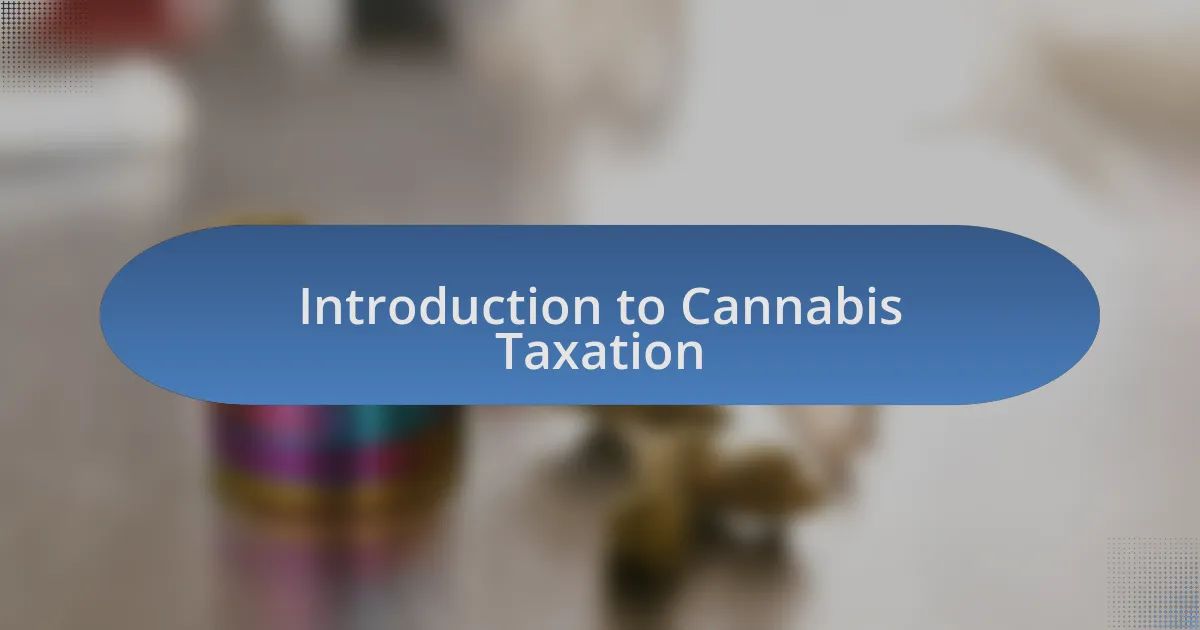
Introduction to Cannabis Taxation
Cannabis taxation is a complex and evolving topic that impacts everyone involved in the industry, from growers to consumers. When I first delved into this area, I was struck by how different states approach tax regulation, revealing a patchwork of systems that can be both confusing and enlightening. Why should understanding these nuances matter? Because they directly influence pricing, market dynamics, and even the accessibility of cannabis products.
As I explored further, I realized that taxes can often feel like a double-edged sword—necessary for funding public services, yet burdensome for businesses striving to thrive. For instance, when I spoke to a small dispensary owner, they shared how high local taxes cut into profits, affecting their ability to invest back into the community. This brings us to a crucial point: how do we balance the need for revenue with the sustainability of a budding industry?
Many might wonder why cannabis taxation isn’t a straightforward process. The truth is, it’s shaped by a myriad of factors, including state laws, federal policies, and public sentiment. Just reflect on your own experiences—have you ever been surprised by an unexpected tax at checkout? Navigating cannabis taxation feels much the same, as I’ve seen firsthand how it can complicate even the most straightforward transactions, inviting continuous conversation around fairness and reform.
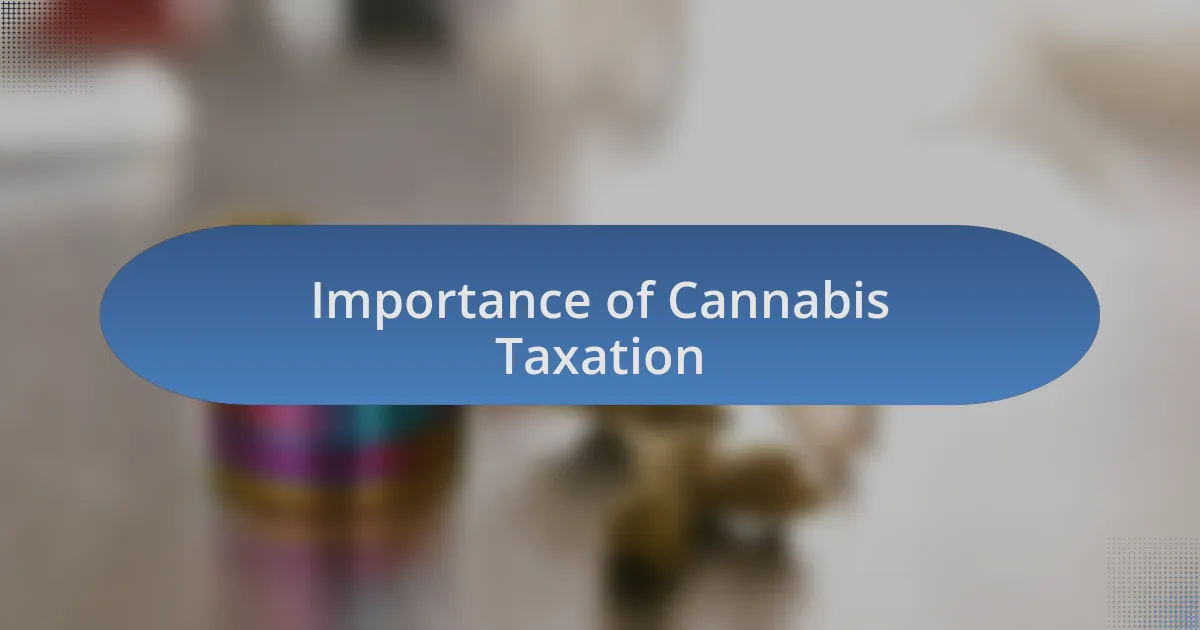
Importance of Cannabis Taxation
Cannabis taxation is critical because it generates essential revenue that supports public programs and infrastructure. When I was volunteering at a community center, I learned how local cannabis taxes funded youth recreational programs and health initiatives. It’s sobering to see how each dollar collected has the potential to positively impact our communities.
Beyond the revenue aspect, proper taxation can also elevate the legitimacy of the cannabis industry. I recall attending a local cannabis expo where industry leaders emphasized that fair taxation not only provides revenue but also fosters an environment of compliance and safety. How can we expect consumers to trust the market if it operates in a gray area? Proper taxation helps eliminate that doubt and encourages professionalism in the sector.
Moreover, the importance of cannabis taxation extends to regulating consumption and promoting responsible use. I remember how a friend expressed concerns about potential overuse in communities where cannabis is easily accessible. When taxes reflect the intent to support health programs and education, it sends a message that cannabis can be part of a responsible and informed lifestyle rather than just a recreational product. This approach is about safeguarding the future of the industry while ensuring that everyone is on the same page regarding its impacts.

Overview of Cannabis Expo
The Cannabis Expo is an exciting event that brings together enthusiasts, industry leaders, and policymakers to share knowledge and insights about the evolving cannabis landscape. I remember my first experience at the expo; the atmosphere was electric with passion and innovation. It’s a unique opportunity to see how far the industry has come and where it’s headed.
At the expo, attendees can explore a variety of exhibits, ranging from the latest cannabis products to groundbreaking technology and research. I’ve always found it inspiring to witness how companies showcase their commitment to quality and safety. Isn’t it fascinating to think about how these innovations are reshaping our understanding of cannabis?
Networking opportunities abound at the Cannabis Expo, allowing individuals to forge connections that can lead to collaboration and growth. I can recall chatting with a group of entrepreneurs who were full of ideas about sustainable cultivation methods. Engaging with others who share your passion can be a catalyst for change, and that’s truly what makes the expo feel like a community gathering.
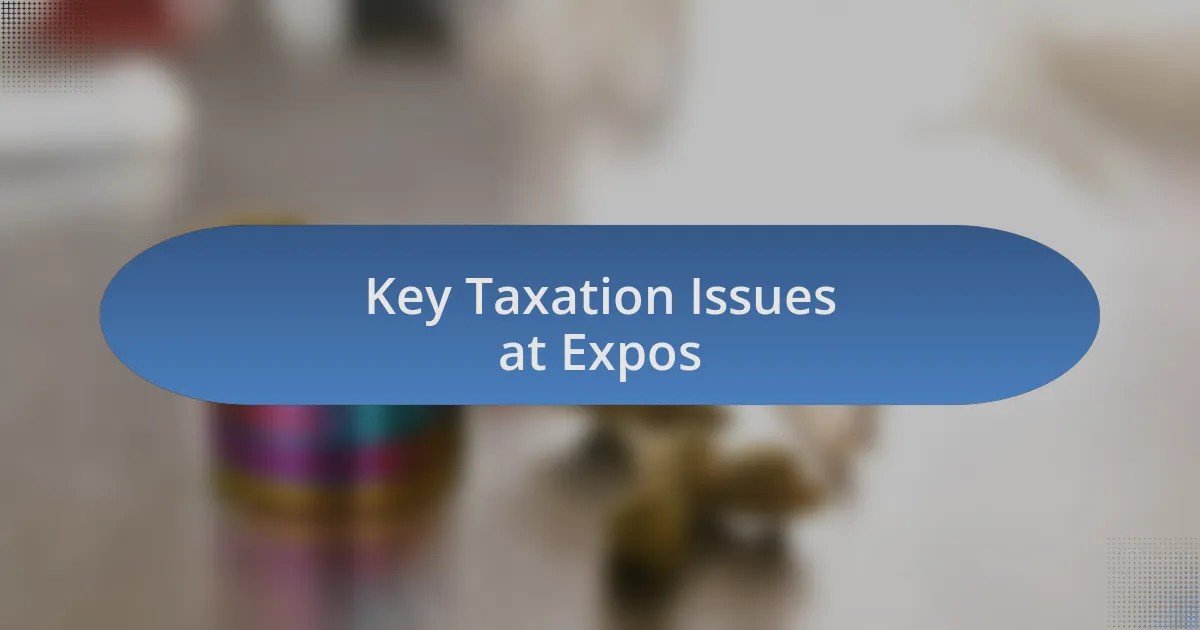
Key Taxation Issues at Expos
When discussing taxation issues at expos, one prominent concern is how differing state and local laws can create confusion. I’ve witnessed firsthand how exhibitors frequently grapple with varying sales tax rates, which can impact pricing strategies. Have you ever found yourself wondering why a similar product costs differently from one booth to another? This discrepancy often boils down to the complex web of cannabis taxation.
Additionally, many vendors face challenges with compliance and reporting requirements. At a previous expo, I spoke with a small business owner caught off-guard by how meticulously they needed to track their sales for tax reporting. It made me realize just how crucial it is for businesses, especially newcomers, to understand the nuances of cannabis tax codes. Without this understanding, can they truly thrive in such a competitive industry?
Lastly, there’s the issue of the federal vs. state tax laws. I often hear attendees express frustration over the lack of a cohesive tax framework, which can stifle growth. It’s fascinating to consider how this ongoing debate not only affects exhibitors but also shapes the entire market. How can businesses plan for the future when the rules seem to change daily?
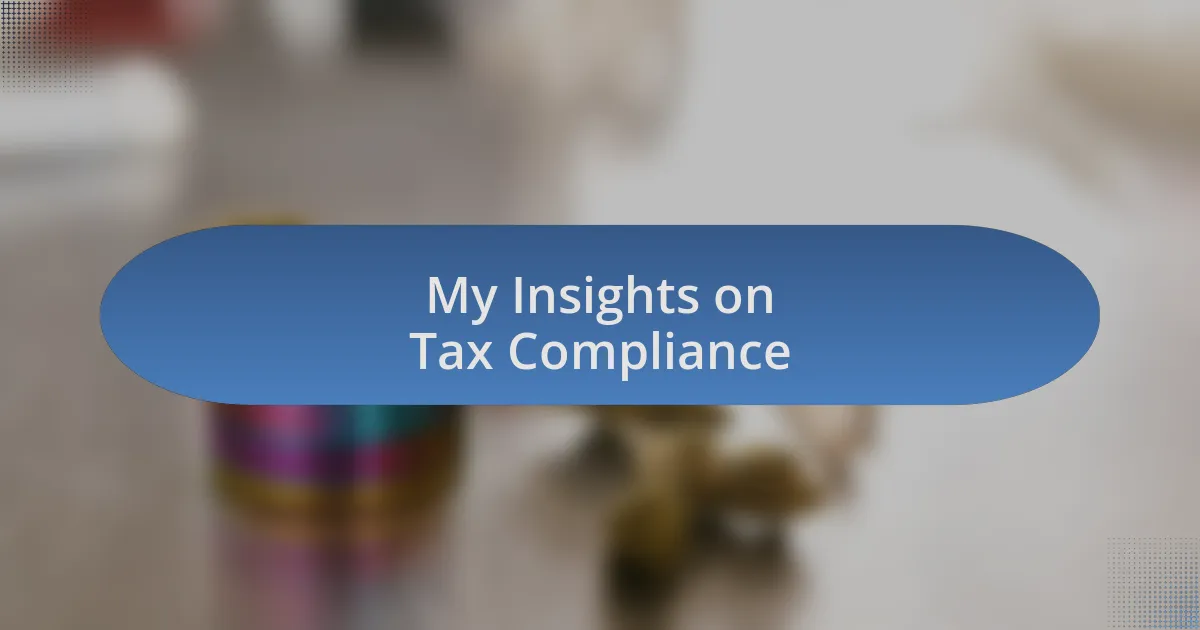
My Insights on Tax Compliance
When it comes to tax compliance, I’ve learned that staying informed is half the battle. At an expo, I chatted with an accountant specializing in cannabis businesses, and he emphasized the importance of keeping meticulous records. It struck me how often people underestimate the role of documentation in avoiding headaches down the line. Have you ever thought about how a simple spreadsheet could save you from a tax audit nightmare?
From my experience, the most successful vendors are the ones who approach compliance as a key part of their business strategy. At one particularly busy expo, a seasoned exhibitor shared how they invested in tax software tailored for cannabis. This not only streamlined their reporting process but also helped them identify potential deductions they hadn’t considered. I can’t help but wonder—could this be the competitive edge that sets successful businesses apart in such a complex market?
I’ve also come to realize the emotional toll that tax compliance issues can take on small business owners. I recall a conversation with a stressed-out vendor who was overwhelmed by the constantly changing regulations. It made me reflect on how vital it is for businesses to create support networks, whether through mentorship or industry groups. How can we foster an environment where knowledge sharing becomes the norm, rather than the exception?
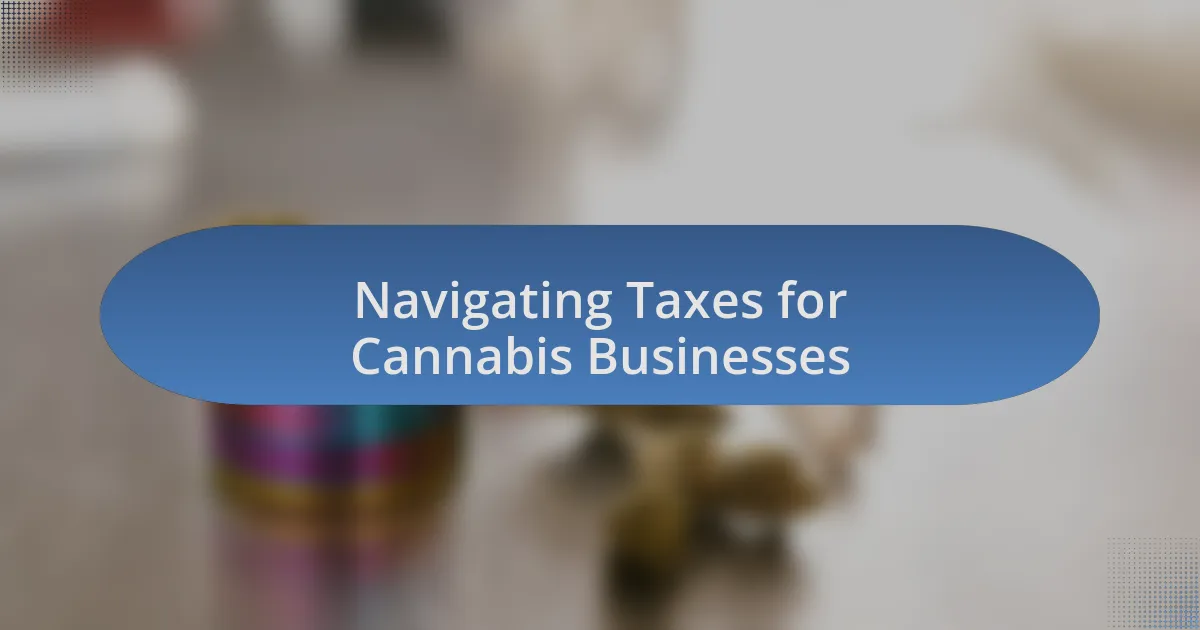
Navigating Taxes for Cannabis Businesses
Navigating taxes in the cannabis industry can feel like walking through a maze. One time, I attended a workshop led by a tax expert who delved into 280E, a crucial section of the tax code that impacts cannabis businesses by disallowing typical deductions. Watching the expressions of attendees transform from confusion to understanding was inspiring—don’t you think clarity can be a turning point for business owners?
Another aspect I’ve found that complicates cannabis taxation is the varying regulations in different states. I remember discussing this with a friend who’s a dispensary owner in California. He mentioned how he had to adapt his financial strategies every time a new regulation rolled out. It leaves me pondering—how do small businesses keep up without burning out?
One thing I’ve learned is the power of community when it comes to navigating these challenges. At last year’s expo, a panel of experienced business owners shared their tax experiences and tips for staying compliant. It struck me how collaboration can lighten the load—what if more business owners started to view sharing tax strategies as a vital part of their networking? This camaraderie not only enhances individual knowledge but strengthens the industry as a whole.

Practical Strategies for Tax Planning
To effectively plan for taxes in the cannabis sector, closely monitoring your expenses is paramount. I recall a workshop where an owner detailed how implementing expense tracking software transformed her ability to categorize deductible costs. Isn’t it fascinating how the right tools can turn months of stress into a streamlined process?
I also discovered firsthand the value of consulting with a tax professional who specializes in cannabis. During my last consult, the insights shared about Section 280E were eye-opening. It drove home the point that understanding tax codes specific to cannabis can lead to substantial savings and future planning opportunities. Have you ever considered how much you might be missing without expert guidance?
Lastly, I recommend frequently reviewing your financial projections in line with evolving laws. I remember recalibrating my budget after a regulation change; it was daunting at first but ultimately contributed to a healthier bottom line. This proactive approach not only minimizes surprises but also enhances your strategic decisions in an ever-changing landscape. How often do you check in on your financial strategy?